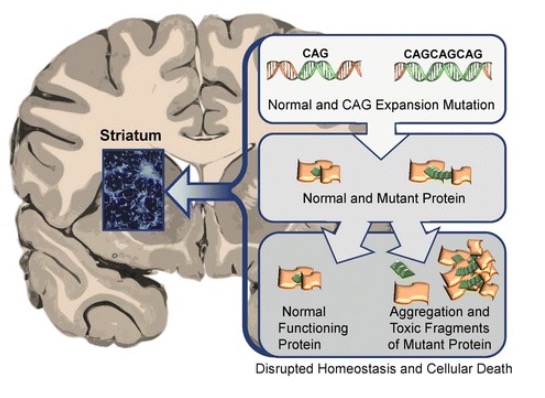Playlist
Show Playlist
Hide Playlist
Mutant Huntingtin (mHTT) and Treatment of Huntington's Disease
-
Slides 03 AnomaliesAgingBrainParkinsonHuntington Aging.pdf
-
Download Lecture Overview
00:01 Let’s take a little closer look about what we know about the huntingtin protein or mHTT. 00:10 It results in a multitude of different effects. First of all, it appears to be clearly most toxic in the brain. 00:21 Anything that has a neurodegenerative effect clearly is going to impact the brain before anything else. 00:28 But we also see that it’s affecting not only connections between the basal ganglia but also it starts affecting connections further out into the brain which is where we see dementia setting in in later stages in the progression. Again, this mHTT forms clusters in neurons. So we have a common theme with all of these disorders of aging. We have dysfunctional proteins being formed that tend to stick together and aggregate forming clusters that get in the way of communication between the cells. 01:11 We can see also the clusters get in the way of regular transcription, so proteins, other proteins, tend to start to be degenerative proteins that are not in their normal form. We also see there are mitochondrial disorders. So along with the neuronal disorders, we have disorders with transcription of other genes and then destruction of mitochondria which result because somehow the caspase system is activated. You probably, “Well, what does caspase get involved in?” Caspase, you may recall, has to do with apoptosis. The mitochondria basically send out caspase to say like, “Whoa! Help me. Rescue me. 02:02 I’m toxic.” Then the immune system will be activated to come along and destroy them. 02:08 So, caspase is a signal that mitochondria use to signal that it’s time for that cell to be degraded. 02:16 That would be a great explanation of why we see the neurons actually being destroyed in those connections. Let’s finally consider what we do in treatment of Huntington’s disease. 02:32 The sad thing here is there really isn’t a lot in the option of treatment at this point. Relieving symptoms is really the most that we can do. It generally will involve sort of a team of individuals because as speech is lost, we might have speech and occupational therapists trying to help regain control of movements as much as possible as well as psychiatry because obviously if you’re experiencing this, there’s a lot of considerations for the health, your mental health or individual’s mental health. 03:16 There have been some effective treatments with Xenazine in reducing the chorea. The word chorea comes from Greek word that means dancing. So, individuals look like they have sort of this stiff dancing motion in the later stages. In the later stages, tetrabenazine is available for treatment of the chorea but that doesn’t really help with all of the symptoms. In short, we have a multidisciplinary team approach to relieving symptoms as much as possible. But again, Huntington’s is a pretty rough disease for everyone involved. In closing this lecture, you should now have all the information that you need to know about Parkinson’s and Huntington’s disease for studying for your exams. Thanks for joining me.
About the Lecture
The lecture Mutant Huntingtin (mHTT) and Treatment of Huntington's Disease by Georgina Cornwall, PhD is from the course Aging. It contains the following chapters:
- Mutant Huntingtin (mHTT)
- Treatment of Huntington's Disease
Included Quiz Questions
Which of the following is true about the mechanism of the pathology of mutant huntingtin (mHTT)?
- Mutant huntingtin causes mitochondrial dysfunction.
- Mutant huntingtin is toxic only in the brain.
- Mutant huntingtin does not affect the cortex of the brain.
- Mutant huntingtin only affects neurotransmitter communication between sub-cortical neurons.
- Mutant huntingtin aids in faster neuronal signaling transmission.
Which of the following provides symptomatic treatment for the later stages of Huntington's disease?
- Tetrabenazine
- Levodopa
- Carbidopa
- Tetracycline
- Acetylcholine
Customer reviews
3,8 of 5 stars
| 5 Stars |
|
2 |
| 4 Stars |
|
1 |
| 3 Stars |
|
0 |
| 2 Stars |
|
0 |
| 1 Star |
|
1 |
Muy buena conferencia, haciendo un buen resumen del tema para un mejor entendimiento general
I was able to learn a lot in a short time . I particularly liked how she simplified the material
Presentation could be a lot better, teacher continues to show lack of preparation as the video went on, not engaging to the viewers.
It was very helpful as I am a visual learner and I was able to add more material to my notes. Plus, I enjoyed that she simplified everything.





